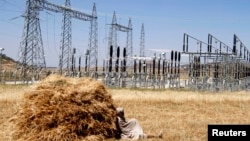Ethiopia's electric company says it has reconnected the Tigray region's capital, Mekelle, to the national grid for the first time in more than a year.
Ethiopian Electric Power spokesman Moges Mekonen told VOA's Tigrigna Service that work was underway to repair damaged power lines in eight other areas of the Tigray region. The director of Mekelle's flagship Ayder Hospital, Kibrom Gebreselassie, told VOA on Wednesday that power has resumed in Mekelle. Residents who spoke to the BBC also confirmed that they are enjoying the "full resumption of electricity."
Ethiopian state media reported Tuesday that power had been restored to the capital.
It was not possible for VOA to immediately verify the claims as Ethiopia's government does not allow journalists into Tigray.
Mekelle's power supply has been erratic since federal forces were forced to withdraw in June 2021, while most of Tigray has been without phone, internet and banking services since war broke out between the federal government and the Tigray People's Liberation Front, or TPLF, more than two years ago.
Aid workers say the lack of services has worsened the humanitarian crisis in Tigray, where 90% of the 6 million population need aid.
The two sides signed a landmark cease-fire deal in early November that restored its services and commited the federal government to "unhindered" aid to the embattled region. However, since the deal was signed, power, internet and phone lines are still down in most parts of the Tigray region. And while food and medical aid has started trickling into the region, it has been limited.
The World Health Organization said Friday it still does not have "unfettered access" to deliver medical supplies to Tigray.
For its part, Tigrayan forces were expected to disband their fighters within 30 days of the November 2 cease-fire.
Tigray's top military commander last week said his forces have withdrawn from 65% of frontline areas but would remain in areas where foreign forces are still present.
Tigrayan leaders accuse Eritrean troops of continuing to commit atrocities in the region, including rapes and executions.
Eritrea denies any wrongdoing and did not take part in the November peace deal.




